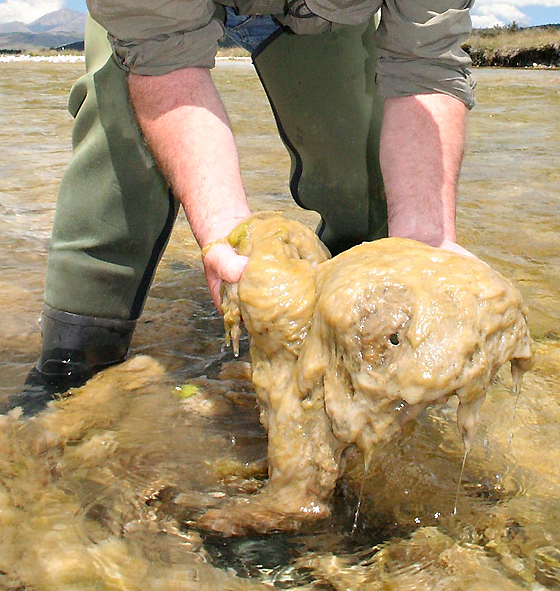 ‘Rock Snot’ (Didymosphenia geminata), is an invasive (non-native) algae. Courtesy photo
‘Rock Snot’ (Didymosphenia geminata), is an invasive (non-native) algae. Courtesy photo
Tres Lagunas Fire Update
- Engines and water tenders must be decontaminated before leaving the fire
PECOS—Firefighters on the Tres Lagunas Fire are now ramping down their fire suppression efforts and transitioning to “mop up” operations.
But before being released from the fire, all water handling equipment, such as engines and water tenders, must be decontaminated.
“The decontamination process is not standard procedure, but it is becoming more common as we travel from fire to fire,” said Mark Catron, deputy logistics section chief, New Mexico Incident Management team.
“Decontamination procedures are an integral part of our system. That’s one of the reasons all teams have resource advisors. They’re the specialists who give us a heads-up if there are known invasive species in the area. It triggers a decontamination process,” says Catron. “We implement the appropriate decontamination procedure, whether we’re dealing with invasive species such as non-native weeds or invasive aquatic hitchhikers. On some fires, to prevent the spread of invasive weeds, all vehicles that were assigned to the fire are pressure-washed. On this fire we have a decontamination procedure to deal with aquatic hitchhikers.”
A complete and thorough decontamination procedure on the fire ensures that two area aquatic hitchhikers, Rock Snot and Whirling Disease, will not be transferred to other areas by equipment and machinery.
“Rock Snot,” (Didymosphenia geminata), is an invasive (non-native) algae. According to New Mexico Environment and Game and Fish department literature, the algae “form large, ugly growths on stream bottoms. These dense mats harm native and wild trout habitat.”
“Whirling Disease,” caused by a Protozoan parasite that affects the nervous system of trout populations, results in a circular swimming behavior and reduces their mobility and fertility.
Decontamination of machinery and equipment is becoming a procedure that today’s firefighters are adding to their mission.
Dennis Stern, task force leader on the fire, is overseeing the decontamination process today. “Anything that has handled water on this incident must be decontaminated,” he states. “This includes everything from pumps, tanks, and hose to the water tenders and engines.”
The equipment is submerged in a bleach solution, then dried. Engines and water tenders draft a bleach solution up through their water systems and flush them out. Smaller pieces, such as fittings, are soaked in buckets of bleach solution.
“Wildland firefighting is simply part of being responsible stewards of the land. Whatever we need to do to fulfill that responsibility we will do,” concluded John Pierson, Incident Commander for the New Mexico Incident Management Team.

